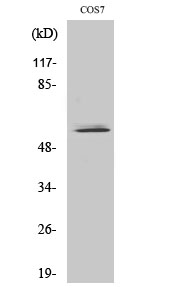NIPA Polyclonal Antibody
- SPECIFICATION
- CITATIONS
- PROTOCOLS
- BACKGROUND

Application
| WB, IF |
|---|---|
| Primary Accession | Q86WB0 |
| Reactivity | Human, Mouse, Rat, Monkey |
| Host | Rabbit |
| Clonality | Polyclonal |
| Calculated MW | 55262 Da |
| Gene ID | 51530 |
|---|---|
| Other Names | ZC3HC1; NIPA; HSPC216; Nuclear-interacting partner of ALK; Nuclear-interacting partner of anaplastic lymphoma kinase; hNIPA; Zinc finger C3HC-type protein 1 |
| Dilution | WB~~Western Blot: 1/500 - 1/2000. Immunofluorescence: 1/200 - 1/1000. ELISA: 1/40000. Not yet tested in other applications. IF~~1:50~200 |
| Format | Liquid in PBS containing 50% glycerol, 0.5% BSA and 0.09% (W/V) sodium azide. |
| Storage Conditions | -20℃ |
| Name | ZC3HC1 (HGNC:29913) |
|---|---|
| Function | Required for proper positioning of a substantial amount of TPR at the nuclear basket (NB) through interaction with TPR. |
| Cellular Location | Nucleus. Nucleus envelope. Note=Resident of the nuclear basket (NB) (PubMed:34440706). Occurs at the nuclear envelopes (NE) of all TPR-containing cell types, including proliferating and non- dividing, terminally differentiated cells of different morphogenetic origin (PubMed:34440706). |
| Tissue Location | Widely expressed. Highly expressed in heart, skeletal muscle and testis. Expressed in brain, placenta, lung, kidney, liver, pancreas, spleen, thymus, prostate, ovary small intestine and colon. Weakly or not expressed in leukocytes |

Thousands of laboratories across the world have published research that depended on the performance of antibodies from Abcepta to advance their research. Check out links to articles that cite our products in major peer-reviewed journals, organized by research category.
info@abcepta.com, and receive a free "I Love Antibodies" mug.
Provided below are standard protocols that you may find useful for product applications.
Background
Essential component of a SCF-type E3 ligase complex, SCF(NIPA), a complex that controls mitotic entry by mediating ubiquitination and subsequent degradation of cyclin B1 (CCNB1). Its cell-cycle-dependent phosphorylation regulates the assembly of the SCF(NIPA) complex, restricting CCNB1 ubiquitination activity to interphase. Its inactivation results in nuclear accumulation of CCNB1 in interphase and premature mitotic entry. May have an antiapoptotic role in NPM-ALK-mediated signaling events.
If you have used an Abcepta product and would like to share how it has performed, please click on the "Submit Review" button and provide the requested information. Our staff will examine and post your review and contact you if needed.
If you have any additional inquiries please email technical services at tech@abcepta.com.













 Foundational characteristics of cancer include proliferation, angiogenesis, migration, evasion of apoptosis, and cellular immortality. Find key markers for these cellular processes and antibodies to detect them.
Foundational characteristics of cancer include proliferation, angiogenesis, migration, evasion of apoptosis, and cellular immortality. Find key markers for these cellular processes and antibodies to detect them. The SUMOplot™ Analysis Program predicts and scores sumoylation sites in your protein. SUMOylation is a post-translational modification involved in various cellular processes, such as nuclear-cytosolic transport, transcriptional regulation, apoptosis, protein stability, response to stress, and progression through the cell cycle.
The SUMOplot™ Analysis Program predicts and scores sumoylation sites in your protein. SUMOylation is a post-translational modification involved in various cellular processes, such as nuclear-cytosolic transport, transcriptional regulation, apoptosis, protein stability, response to stress, and progression through the cell cycle. The Autophagy Receptor Motif Plotter predicts and scores autophagy receptor binding sites in your protein. Identifying proteins connected to this pathway is critical to understanding the role of autophagy in physiological as well as pathological processes such as development, differentiation, neurodegenerative diseases, stress, infection, and cancer.
The Autophagy Receptor Motif Plotter predicts and scores autophagy receptor binding sites in your protein. Identifying proteins connected to this pathway is critical to understanding the role of autophagy in physiological as well as pathological processes such as development, differentiation, neurodegenerative diseases, stress, infection, and cancer.


